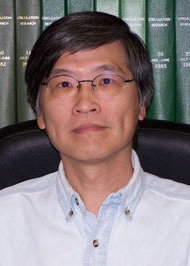Tzyh-Chang Hwang, PhD
Professor, Department of Medical Pharmacology and Physiology, School of MedicineOffice Location: 263 DCRC
Office Phone: 573-882-2181
HwangT@missouri.edu
Research Interests
Structure-function studies of CFTR chloride channel
Research Description
The main focus of Hwang's research is on electrophysiological studies of the CFTR (Cystic Fibrosis Transmembrane Conductance Regulator) chloride channel. Cystic fibrosis (CF) is the most common lethal genetic disease in the United States. Defects in the CFTR chloride channel in patients with CF result in dehydrated viscous mucus in the airway believed responsible for the most severe symptoms of the disease.
To date, more than 800 different mutations have been identified as disease-associated, but the most prevalent mutation is the deletion of a single amino acid, phenylalanine 508 (Delta F508). It is well established that two ATP-dependent processes are involved for normal CFTR function.
First, the channel has to be phosphorylated by the cAMP-dependent protein kinase (PKA). Second, ATP hydrolysis by the nucleotide binding domains (NBD1 and NBD2) controls the opening and closing of PKA-phosphorylated CFTR channels.
Hwang's recent work has indicated that the phosphorylation activation step is rate-limiting for CFTR function in an intact cell and that a slow phosphorylation or/and a faster dephosphorylation of Delta F508-CFTR results in an abnormal response of this mutant channel to cAMP stimulation. This abnormality may contribute to the pathophysiology of CF.
Using a combination of molecular biological, biochemical and electrophysiological techniques, future research is aimed at tackling the following questions:
- How are the channels modulated by phosphorylation at multiple consensus serine residues?
- What are the phosphatases involved?
- How is the disease-associated mutant CFTR affected? How can we amend the defect?
- How is the energy of ATP hydrolysis harvested and transduced to protein conformational changes in CFTR gating?
- What are the structural changes in CFTR gating?
- What are the functional roles of NBD1 and NBD2 in controlling CFTR gating?
Working together with a team of CF investigators, Hwang anticipates future application of the bench-side, basic science results to the clinical therapeutics in CF.
Professional Background
- Obtained MD degree from the National Yang-Ming Medical College, Taiwan.
- Obtained MS, National Taiwan University.
- Obtained PhD in physiology from Johns-Hopkins School of Medicine.
- Completed postdoctoral training at Rockefeller University.
- Served as assistant professor in the Laboratory of Cardiac/Membrane Physiology, Rockefeller University.
- Member of the Biophysical Society
- Curently funded by the National Institutes of Health (NIH) and the Cystic Fibrosis Foundation.
Selected Publications
- Physiological and pharmacological characterization of the N1303K mutant CFTR. DeStefano S, Gees M, Hwang TC. J Cyst Fibros. 2018 Sep;17(5):573-581. doi: 10.1016/j.jcf.2018.05.011. Epub 2018 Jun 7. PMID: 29887518
- Structural mechanisms of CFTR function and dysfunction. Hwang TC, Yeh JT, Zhang J, Yu YC, Yeh HI, Destefano S. J Gen Physiol. 2018 Apr 2;150(4):539-570. doi: 10.1085/jgp.201711946. Epub 2018 Mar 26. Review. PMID: 29581173
- Cystic fibrosis research topics featured at the 14th ECFS Basic Science Conference: Chairman's summary. Mall MA, Hwang TC, Braakman I. J Cyst Fibros. 2018 Mar;17(2S):S1-S4. doi: 10.1016/j.jcf.2017.11.008. Epub 2017 Dec 9. Review. PMID: 29229473
- Ion channels as targets to treat cystic fibrosis lung disease. Martin SL, Saint-Criq V, Hwang TC, Csanády L. J Cyst Fibros. 2018 Mar;17(2S):S22-S27. doi: 10.1016/j.jcf.2017.10.006. Epub 2017 Nov 6. Review. PMID: 29102290
-
Electrostatic tuning of the pre- and post-hydrolytic open states in CFTR. Zhang J, Hwang TC. J Gen Physiol. 2017 Mar 6;149(3):355-372. doi: 10.1085/jgp.201611664. Epub 2017 Feb 27. PMID: 28242630
- CFTR potentiators: from bench to bedside. Jih KY, Lin WY, Sohma Y, Hwang TC. Curr Opin Pharmacol. 2017 Jun;34:98-104. doi: 10.1016/j.coph.2017.09.015. Epub 2017 Nov 5. Review. PMID: 29073476
- A common mechanism for CFTR potentiators. Yeh HI, Sohma Y, Conrath K, Hwang TC. J Gen Physiol. 2017 Dec 4;149(12):1105-1118. doi: 10.1085/jgp.201711886. Epub 2017 Oct 27. PMID: 29079713




